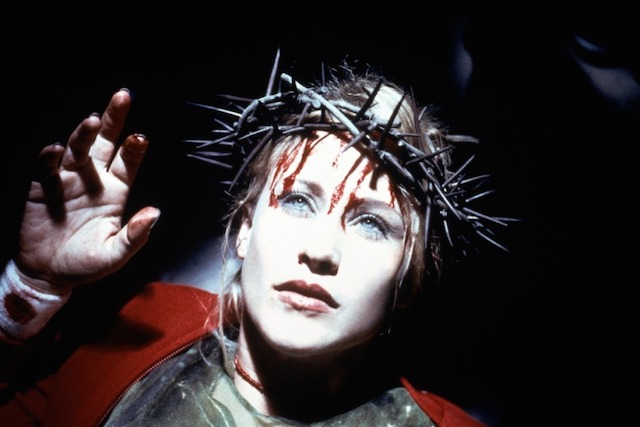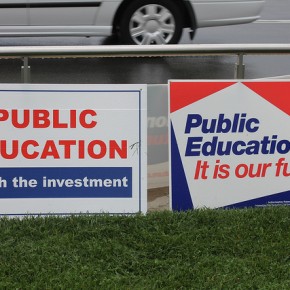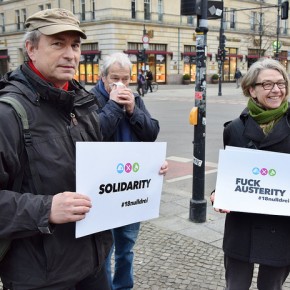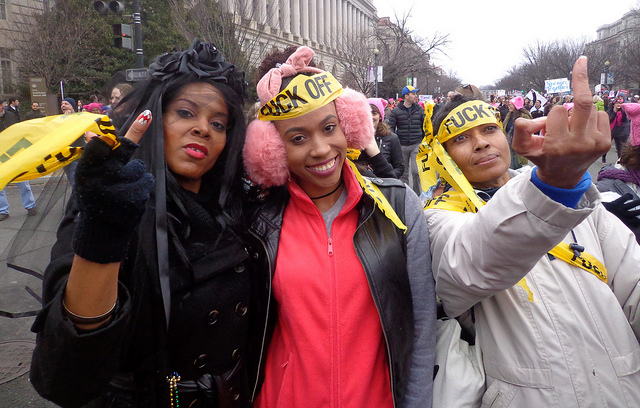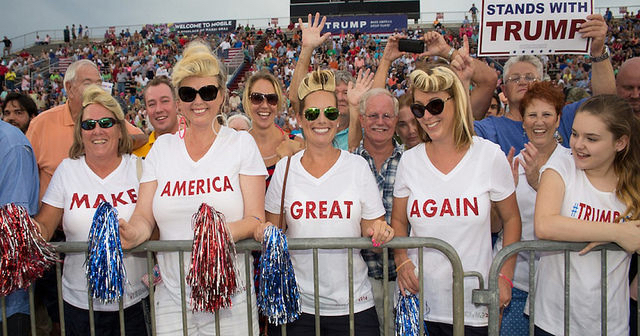When she won the Oscar for Best Supporting Actress for her role in Boyhood, Patricia Arquette delighted many with her call for wage equality in her acceptance speech. It was a timely call, for its political appeal and because it likely struck a nerve for many in Dolby Theatre, seeing as the Sony hack had revealed that actresses, even top box office earners, receive less than actors. It also had the benefit of yielding an image that delighted for a few hours at least.
Later in the pressroom, Arquette also disappointed many she articulated her wish for greater solidarity in the way that she did:
“It’s time for all the women in America, and all the men that love women and all the gay people and all the people of colour that we’ve all fought for to fight for us now.”
This rightly generated shudders, ‘ughs’, and critique in its omission of intersectionality. The statement absented queer women, women of colour, and queer women of colour from the discussion. Omitting allies is never good. (And in case the reader thinks I’m ok with such omissions, please reread the paragraph.)
But you know what’s also not good? Putting all one’s hopes for a spokesperson for women in America on a single actor– one likely drunk with delight in a career win and drunk in general (if reports from the Red Carpet have any truth to them).
Even if she were drunk, Arquette still called out the mani-cam and asked for deeper questions for actresses in keeping with the #askhermore campaign. This may seem minor in the grand scheme of things, but haven’t many of us been struggling to identify and combat the microaggressions that are so readily ignored and dismissed? These are invisible ways in which racism, sexism, homophobia, anti-Semitism, Islamophobia, and copious other isms are perpetuated. However, their ‘size’ encourages one to overlook their harm, and to require those affected to suck it up.
Of course, Arquette’s drunken omission could fall into that category, so again, it’s good that this was seized upon, particularly for the opportunity it provides for all-too-often absent voices to take the stage.
Yet there’s something about the backlash that doesn’t sit well. Once again, ‘white liberal feminism’ came to the fore—brought by those just as invested in feminist action. These points are essential. As with the Hollaback video, the torrent of critique is warranted. But as with the Hollaback video, I also question the torrent and its tone as yet again, that familiar accusation of white bourgeois feminism offers a way to shut down and dismiss the larger point– one that Arquette clumsily sought: A solidarity movement in which everyone participates (which is something I’ve not seen as men do often dismiss the rights of women as secondary to the injustices they can face). And a solidarity movement in which certain grievances, long and so easily dismissed (‘wage-equality? But what about rape as a weapon of war?’) can be taken seriously. After all, in Boyhood didn’t we see the story of a woman who was faced with deep poverty, even as she strived for middle class achievements of an advanced degree and professional career? (Her ex, on the other hand, seemed to face no such financial anxiety or precarity.)
Is there a way we can seize on such moments, not to highlight fracture and use it to undo a movement, but to strengthen it instead? I imagine that’s what these pieces might hope to do. But is there a way we can also work to identify the problems without defaulting to this rhetorical trope that increasingly feels like shorthand for petty narcissistic foolishness? Is there a way to address these statements in a manner that unites, and that restores the solidarity that was ironically disrupted in Arquette’s sloppy pressroom plea?
This is not requesting silence for the sake of a larger movement. Such a request (going on in many places) is unacceptable. Rather, I ask how we can identify problems without pillorying celebrities (or others unfortunate enough to take the spotlight for a moment) and how we can pursue their rectification without once again raising that strange (and not exactly powerful) bogeyman of white liberal feminism. It just seems that each time something happens, this is seen as the problem rather than the copious others that plague women of all races, ethnicities, sexualities, and identities. This figure is not quite a straw man, since the privileges of the white bourgeoisie simply cannot be discounted. But at the same time, how often is this figure held up as the largest problem?
I find myself torn in my efforts at a conclusion. How much I don’t wish to end with a feeble, ‘Can’t we all just get along?’ Yet in some ways, the exhaustion of this statement captures my own. Feminism is not alone among social movements in that it is held to a higher standard (probably because of the number of informed and committed participants, or at least my friends and media). But is there a way forward that doesn’t feel as if the legitimacy and health of a social movement doesn’t hinge on the fuckups of drunk (or even sober) celebrities?
A POSSIBLY UNPROFESSIONAL UPDATE [1 March]:
I’ve been thinking about the Patricia Arquette kerfuffle further, particularly as it seemed to inspire heated discussions with some, and,annoyingly enough, led to precisely the divisions and accusations that I had wanted to trouble. There seemed to be a feedback loop among other things, and I wanted to think about how to push forward in a way that takes into account the critique, but doesn’t get mired in it.
There are two ways to read what she said in the press room, and I thinks it’s essential both are taken into account. The first, as is widely acknowledged, is as an expression that elides the existence of variety of people in all their diversity, and particularly the diversity of women. This is or should be maddening for everyone, not just those rendered invisible.
The second has been less discussed but is crucial: Arquette is expressing the secondary status women and women’s rights have held across the board and across movements. To explain with examples:
1. Back in the 1990s, in DC, a friend of mine and I came up with a fundraising plan for Lesbian Avengers (our chapter) during pride weekend. We wanted to raise money for a women’s health initiative. The response to our choice was questioned. ‘Why not the Gay Men’s Health Crisis?’ we were asked, since it was our duty to recognise AIDS and come to the help of our brothers. After all, this was pride. Obviously, this was and is an important issue but what was noteworthy to me then was how women’s health was not perceived as a queer issue. Meanwhile, no matter how great Human Rights Campaign Fund (now HRC) was, its interests often felt very limited in terms of goals and its imagined public. (And this extends well into trans communities as well.) Given Arquette’s age, I would not be surprised if she had encountered moments like that, in which women’s issues were not seen as a crucial part of that movement even if women themselves were.
2. In terms of the civil rights movement and its continued existence, black women have played an enormous role. Bless Ava DuVernay and Selma for actually reflecting that more than many historical films have. Moreover, we’d have to be blind not to see the women in the streets today, protesting the acquittal— the systematic acquittal— of the murderers of black men. But one thing less discussed has been the fact that black women have also been murdered. Some friends share those names as well but they are not as known. And the dangers specific to black women considerably less discussed, or so it seems to me. Women play a role in the movement but their concerns are not as foregrounded.
In effect, one could (and I think should) read Arquette’s clumsy statement in terms of the solidarity she aimed to provoke. Women’s issues have taken a back seat long enough, even if the women have always been there. It’s time that all of our allies and partners should get on board with the importance of women’s issues— issues for every category of women. And if you all feel that’s already happened, well bless. And where are you? Because I’ve certainly not seen it save for in small and occasional instances.
When someone like Patricia Arquette, not a campaign or community organiser nor an academic, tries to say something and gains a unique platform for expression should we take that moment to focus on all that’s wrong with it? Or, can we use this moment more strategically? Can we acknowledge the problems as we work to provide a more efficient popular vocabulary and adopt a productive interpretation? That is, can we take this moment to set a more progressive agenda? If we leave it to these moments and to the people whose job this isn’t, we’ll all be kind of screwed.
Stigmata screenshot courtesy of MGM. All rights reserved.
